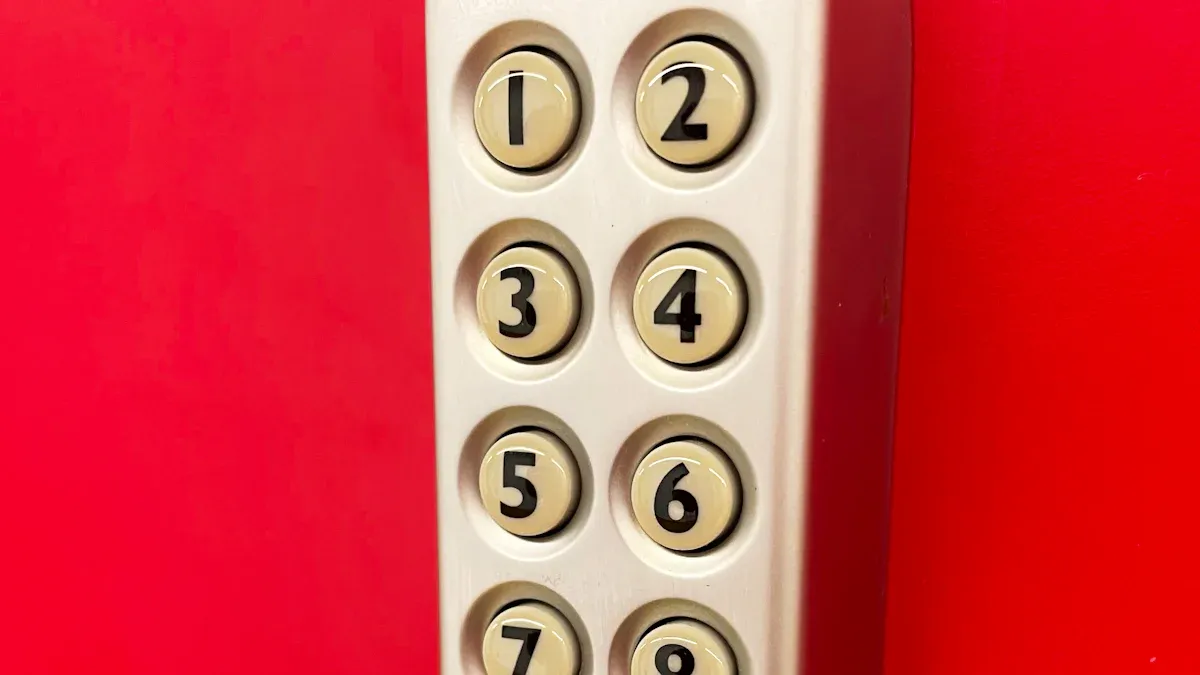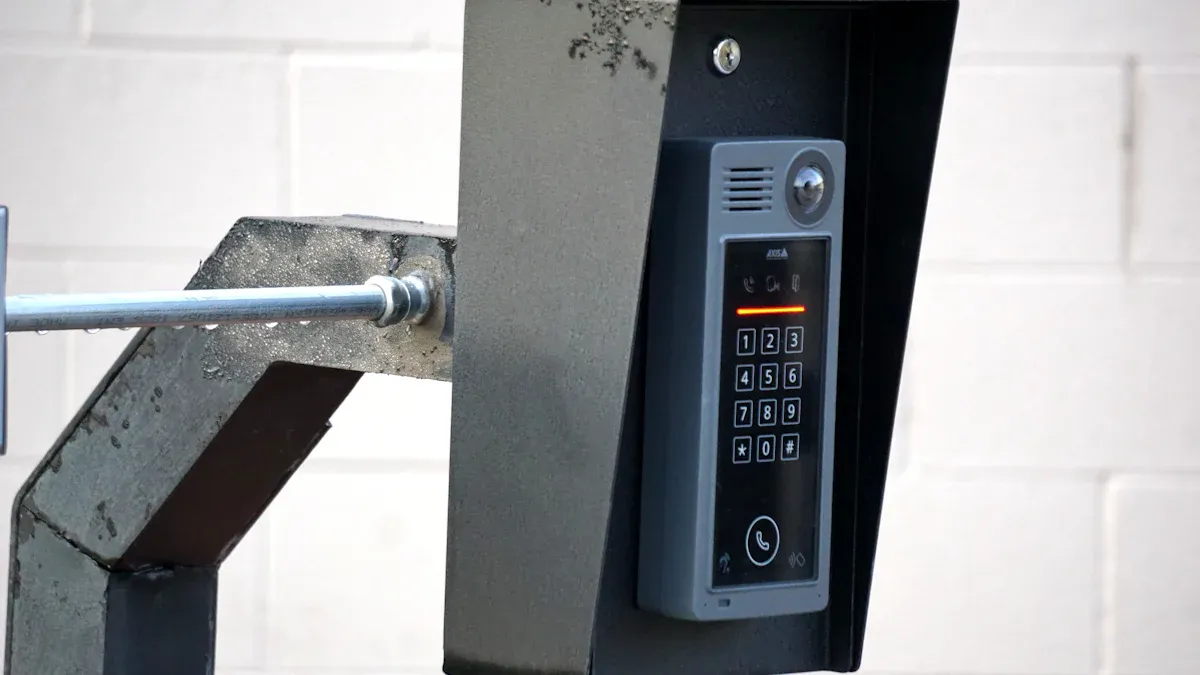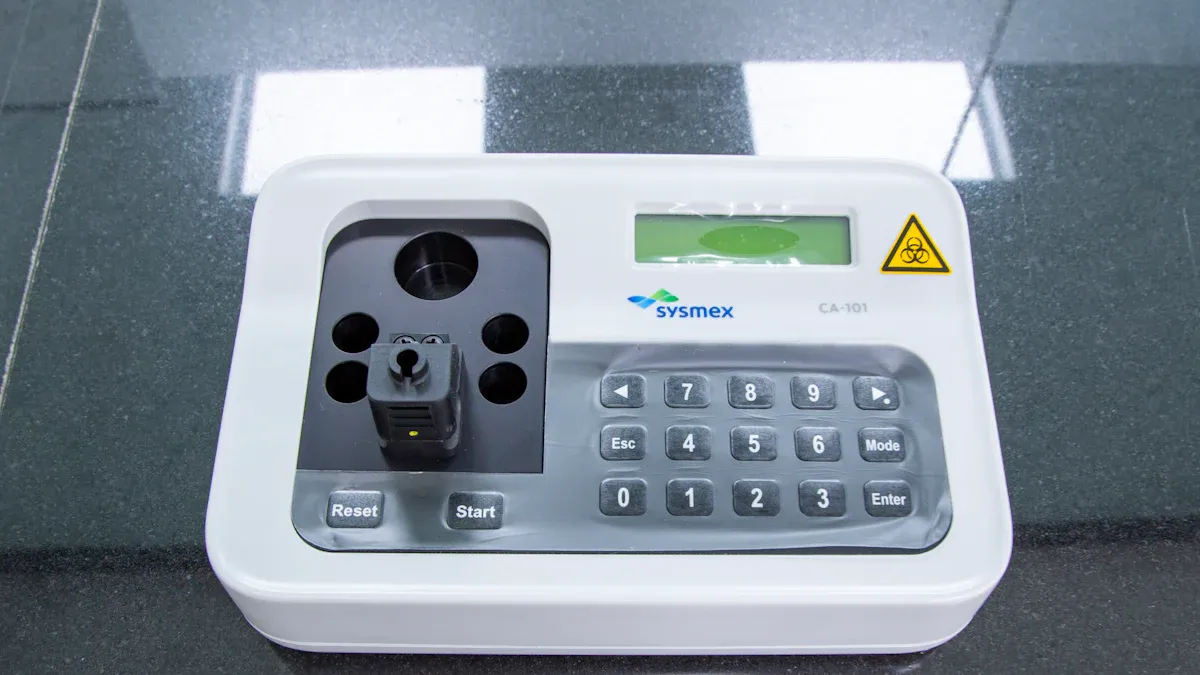
In industrial environments, you depend on durable and efficient tools. An RS232 industrial keypad provides a robust solution for data input. Its compatibility with legacy systems ensures seamless integration. Unlike a USB keypad, it utilizes a serial connection. Whether you require an RS232 keypad, a UART keypad, or a 12 keys keypad, this technology guarantees reliability and simplicity.
Key Takeaways
- RS232 industrial keypads are strong and can handle tough conditions. They work well in hard industrial settings.
- These keypads can connect to old systems easily without extra costs.
- RS232 keypads are cheap but send data slower and can’t grow much. This might not fit today’s industrial needs.
Understanding RS232 Industrial Keypads

What Are RS232 Industrial Keypads?
An RS232 industrial keypad is a specialized input device designed for industrial environments. It connects to machines or systems using the RS232 communication protocol, which is a standard for serial data transmission. This type of keypad allows you to input commands or data directly into equipment, making it a vital tool in settings where automation and precision are essential.
Unlike modern USB keypads, RS232 industrial keypads rely on a serial connection. This makes them compatible with older systems that still use RS232 ports. Their design focuses on durability and functionality, ensuring they can withstand harsh conditions like extreme temperatures, dust, and moisture.
Tipp: If your equipment uses legacy systems, an RS232 industrial keypad can save you from costly upgrades.
Key Features of RS232 Keypads
RS232 industrial keypads come with several features that make them suitable for demanding environments:
- Rugged Construction: Built to endure physical wear and tear.
- Weather Resistance: Many models are sealed to protect against water and dust.
- Customizable Layouts: Some keypads allow you to configure keys for specific tasks.
- Reliable Connectivity: The RS232 protocol ensures stable communication with compatible devices.
These features make the keypad a dependable choice for industrial applications.
Common Uses in Industrial Settings
You’ll find RS232 industrial keypads in various industries. They are commonly used in manufacturing plants for controlling machinery. Warehouses use them for inventory management systems. In transportation, they assist with data entry in logistics operations. Their simplicity and reliability make them ideal for environments where efficiency is critical.
Note: These keypads are especially useful in settings where modern interfaces are unnecessary or unavailable.
Advantages of RS232 Industrial Keypads
Durability and Rugged Design
RS232 industrial keypads are built to last. Their rugged construction allows them to withstand harsh environments, including extreme temperatures, dust, and moisture. You can rely on these keypads in settings where other devices might fail. Many models feature sealed designs, protecting internal components from damage. This durability ensures long-term performance, even in demanding industrial applications.
Tipp: If your workplace involves heavy machinery or exposure to tough conditions, an RS232 industrial keypad can handle the challenge.
Compatibility with Legacy Systems
One of the standout benefits of RS232 industrial keypads is their compatibility with older systems. Many industrial facilities still rely on legacy equipment that uses the RS232 communication protocol. These keypads integrate seamlessly with such systems, saving you the cost and hassle of upgrading to newer technologies. This compatibility makes them an excellent choice for maintaining operational efficiency without significant investments.
Cost-Effectiveness
RS232 industrial keypads offer a budget-friendly solution for industrial needs. Their simple design and compatibility with existing systems reduce the need for expensive upgrades. You also save on maintenance costs due to their durability. For businesses looking to optimize expenses without compromising functionality, these keypads provide excellent value.
Simplicity and Ease of Use
The straightforward design of RS232 industrial keypads makes them easy to use. You don’t need extensive training to operate them. Their intuitive layouts allow quick data entry, improving productivity in fast-paced environments. Additionally, the RS232 protocol ensures reliable communication, so you can focus on your tasks without worrying about connectivity issues.
Note: Simplicity doesn’t mean sacrificing performance. These keypads deliver consistent results while remaining user-friendly.
Drawbacks of RS232 Industrial Keypads
Slower Data Transmission Speeds
RS232 industrial keypads operate using the RS232 communication protocol, which has slower data transmission speeds compared to modern alternatives like USB or Ethernet. This limitation can affect performance in applications requiring rapid data input or processing. If your operations rely on real-time data exchange, this slower speed might create bottlenecks. While the protocol is reliable, its speed constraints make it less suitable for high-performance environments.
Limited Scalability and Range
The RS232 protocol supports only point-to-point communication, which limits scalability. You can connect one keypad to one device, but expanding the system to include multiple devices becomes challenging. Additionally, the range of RS232 connections is limited to about 50 feet under optimal conditions. This restriction can pose problems in large industrial facilities where devices are spread across significant distances.
Susceptibility to Interference in Noisy Environments
Industrial environments often have high levels of electrical noise from machinery and equipment. RS232 industrial keypads are susceptible to interference in such conditions. This interference can lead to data corruption or communication errors. Shielded cables and proper grounding can reduce the impact, but these solutions add to the overall cost and complexity.
Tipp: If your facility has significant electrical noise, consider alternative keypads with better noise immunity.
Risk of Obsolescence in Modern Applications
As technology advances, the RS232 protocol is becoming less common in modern systems. Many new devices no longer include RS232 ports, favoring USB or wireless connections instead. This trend increases the risk of obsolescence for RS232 industrial keypads. If you plan to upgrade your equipment in the future, you might face compatibility issues, making these keypads less practical in the long term.
Practical Applications and Considerations

Ideal Scenarios for RS232 Keypads
An RS232 industrial keypad works best in environments where durability and legacy system compatibility are essential. You might find it ideal for facilities that rely on older equipment with RS232 ports. These keypads perform well in manufacturing plants, warehouses, and transportation hubs where harsh conditions demand rugged devices. Their simplicity makes them a great choice for tasks like controlling machinery or entering data into inventory systems.
Tipp: If your operations don’t require high-speed data transfer or advanced connectivity, these keypads can provide a cost-effective solution.
Limitations in Modern Industrial Environments
Modern industrial environments often demand faster data transmission and greater scalability. RS232 industrial keypads fall short in these areas. Their limited range and point-to-point communication make them less suitable for large facilities with interconnected systems. Additionally, the increasing shift toward USB and wireless technologies reduces their relevance in cutting-edge applications. If your facility plans to adopt modern equipment, these keypads may not meet your future needs.
Key Factors to Evaluate When Choosing an Industrial Keypad
When selecting an industrial keypad, consider your specific requirements. Evaluate the compatibility of the keypad with your existing systems. Assess the environmental conditions, such as temperature, dust, and moisture, to ensure the keypad’s durability. Think about the scalability of your operations. If you anticipate growth or modernization, you might need a more advanced solution. Finally, weigh the cost against the features to find the best fit for your budget and needs.
Note: Always prioritize functionality and reliability over unnecessary features.
RS232 industrial keypads offer a dependable and affordable solution for specific needs. You’ll find them ideal for legacy systems and harsh environments. However, their slower speeds and limited scalability make them less suitable for modern setups.
Tipp: Evaluate your system’s requirements carefully to decide if RS232 keypads meet your operational goals.
FAQ
1. Can RS232 industrial keypads work with modern systems?
RS232 keypads can connect to modern systems using adapters or converters. However, they may not fully support advanced features available in newer communication protocols.
Tipp: Check your system’s compatibility before purchasing.
2. How do you maintain an RS232 industrial keypad?
Clean the keypad regularly with a soft, damp cloth. Avoid harsh chemicals. Inspect cables and connections for wear to ensure reliable performance in industrial environments.
3. Are RS232 keypads customizable?
Yes, many RS232 keypads allow key customization. You can program specific keys for unique tasks, improving efficiency in specialized industrial applications.
Note: Consult the manufacturer’s manual for programming instructions.


